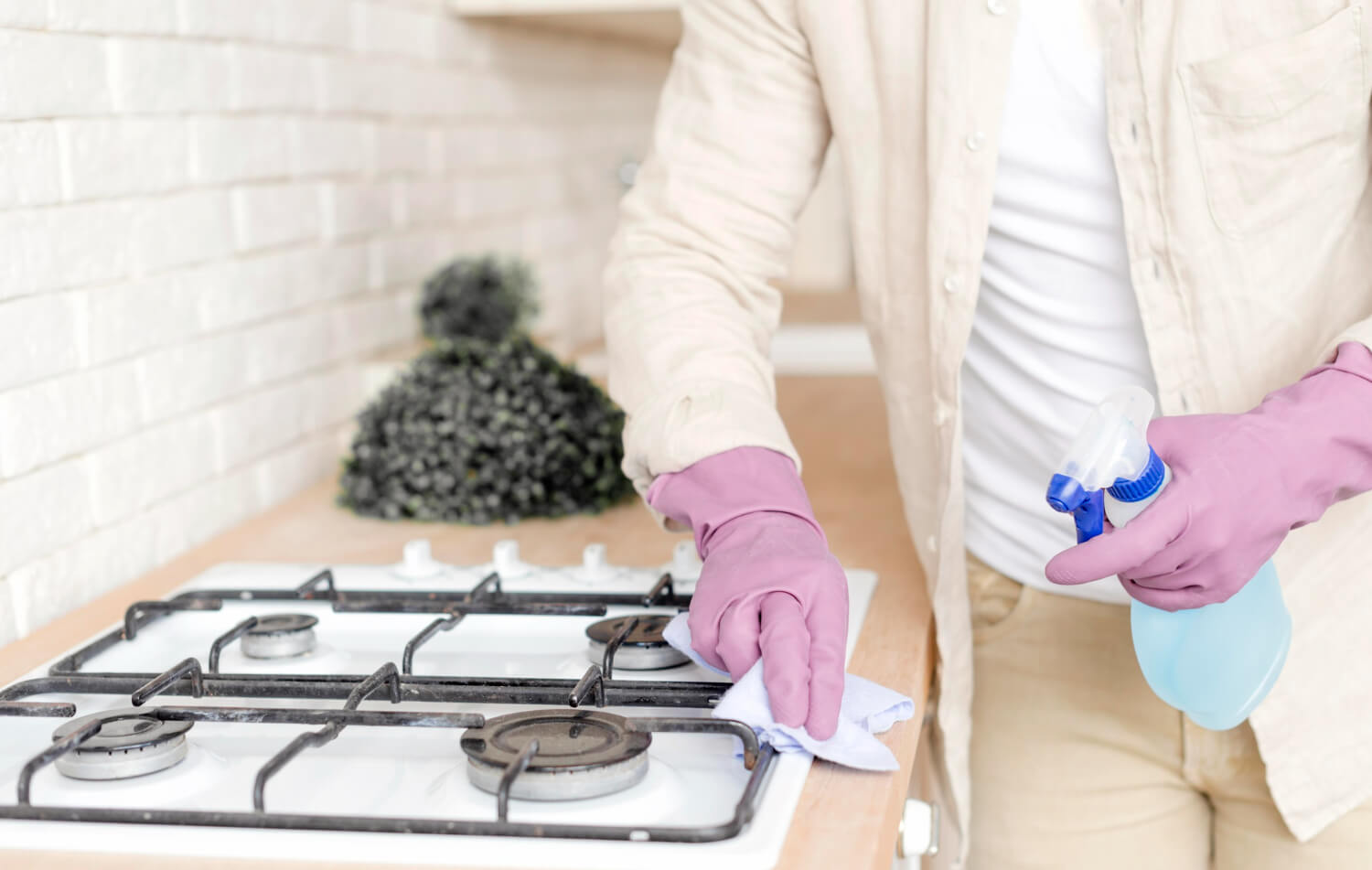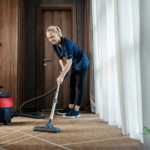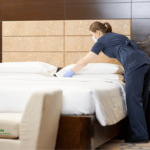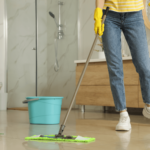The warm summer months can bring an influx of unwelcome pests into your home. When the weather heats up, insects, rodents, and other critters seek refuge in cooler indoor spaces. However, with some diligent cleaning habits and pest-proofing techniques, you can keep pests at bay this summer. Follow these top cleaning tips to avoid pests in the heat and maintain a clean, pest-free home all season long.
Table of Contents
- Keep Your Kitchen Spotless
- Eliminate Water Sources
- Take Out The Trash
- Keep Your Home Clutter-Free
- Seal Up Entry Points
- Inspect Items Before Bringing Them Inside
- Store Firewood Properly
- Practice Good Sanitation Outdoors
- Schedule Regular Pest Control Treatment
- Set Traps For Early Detection
- Frequently Asked Questions About Summer Pest Prevention
Keep Your Kitchen Spotless
The kitchen is a major attraction for household pests looking for crumbs and spills to feed on. Be meticulous about cleaning up food residues and wiping down surfaces after cooking and eating. Sweep, mop, and vacuum the floors frequently to remove any dropped food or grease.
Clean dirty dishes right away and don’t allow them to pile up in or near the sink, as this provides access to food waste for pests. Take out the garbage daily so food scraps don’t accumulate. Store open dry foods like flour, rice, and cereals in airtight containers so pests can’t get into them. A clean, spill-free kitchen leaves nothing behind for pests to feed on.
Eliminate Water Sources
Spills, leaks, and excessive moisture attract pests who need water to survive. Check under sinks and appliances and fix any leaky plumbing or dripping faucets. Wipe up spills right after they happen and dry any wet surfaces completely. Run the fan or open windows when showering or boiling water to lower indoor humidity.
Get rid of pet water bowls and cache pots that aren’t drying out fully between waterings. Dump standing water from houseplants into the sink rather than back into the cache pot. Eliminating excess water deprives pests of the hydration they need to thrive indoors.
Take Out The Trash
Garbage contains food scraps and odors that lure pests looking for an easy meal. Bring trash cans out to the curb for pickup at least twice a week in the summer. Use cans with tight-fitting lids to keep pests out. Rinse recyclables before putting them in bins to remove residue that could attract pests.
Don’t allow trash bags to sit on the ground and get chewed through by rodents – place them in a covered bin right away. Keep trash areas clean by immediately sweeping up any spilled debris. Taking out waste frequently denies pests their favorite food source.
Keep Your Home Clutter-Free
Clutter provides places for pests to hide, breed, and build nests inside your home. Do a deep clean and clear out storage areas, pantries, closets, attics, basements, garages, and sheds. Get rid of unused items, debris, stacks of paper goods, old clothes, and other clutter. Vacuum behind and under furniture to remove dust, dirt, and food crumbs where pests like to lurk.
After decluttering, perform regular maintenance by putting items back in their designated storage spaces after use. Clutter-free conditions leave no habitat or breeding grounds where pests can take up residence.
Seal Up Entry Points
One of the most important pest prevention steps is sealing cracks, crevices, holes, and gaps where pests enter your home. Inspect windows and doors for openings and install weatherstripping to close them up. Caulk along the interior of baseboards, cabinets, pipes, vents, and any cracks in walls or floors.
Fix damaged screen doors and windows that could allow pests inside. Use steel wool or copper mesh to plug larger holes leading outdoors. Keep doors closed rather than propped open, especially at night. Sealing up all access points keeps pests securely outside where they belong.
Inspect Items Before Bringing Them Inside
Pests can hitchhike their way indoors on packages, grocery bags, plants, boxes, and secondhand items. Carefully check anything entering your home and refuse delivery of obviously infested items. Wash or quarantine new plants before having them inside.
Inspect groceries when unpacking them and don’t store paper bags or cardboard boxes that could harbor pests. Clean or isolate any questionable items in a sealed container or plastic bag placed outdoors. Prevent pests from sneaking inside by thoroughly examining all items that cross the threshold.
Store Firewood Properly
Firewood, woodpiles, and mulch provide the perfect habitat for pests like termites, ants, cockroaches, and rodents. Only bring firewood inside immediately before burning it. Otherwise, stack woodpiles at least 20 feet from your exterior walls and elevate them off the ground.
Remove any wood debris from the yard and make sure mulch is not touching your home’s foundation. Moving firewood and yard waste away from your home eliminates a key nesting place that appeals to many invasive pests.
Practice Good Sanitation Outdoors
Just like indoors, keep your backyard, patios, decks, and outdoor areas free of clutter, debris, and potential food sources. Trim overgrown plants, bushes, grass, and vines that touch your home’s exterior. Rake up fallen leaves, sticks, and lawn debris regularly.
Keep compost bins away from the house and ensure they have secure lids and drainage holes. Stack outdoor items neatly and cover barbecue grills, propane tanks, and equipment when not in use. Eliminating pest habitats outside creates a buffer zone that keeps them from getting closer to your house.
Schedule Regular Pest Control Treatment
No matter how spotless you keep your home, pests still occasionally find a way inside. Work with a professional pest control company and schedule regular preventative treatments year-round. Technicians can treat both indoors and outdoors and provide solutions customised for common pests in your local area.
They can also advise on appropriate products and techniques to enhance your cleaning regimen for maximum pest prevention. Combining vigilant housekeeping with professional treatments gives you the best defense against pests trying to sneak in this summer.
Set Traps For Early Detection
Setting traps around possible pest entry points allows for early detection before major infestations occur. Glue traps, bait stations, pheromone traps, and other pest-monitoring tools give you eyes throughout the house. Check traps frequently and contact pest control if any pests are captured.
Trapping pests as soon as they show up prevents populations from multiplying and spreading further into your home. Prompt removal keeps infestations contained before they get out of hand.
Keeping your home clean and inhospitable to pests requires diligence and consistent effort, especially during summer’s hot temperatures. But implementing these cleaning tips and best practices arms you with an effective pest management plan. Stop pests in their tracks this season with proactive housekeeping habits and prevention.
For more advice on keeping pests away this summer, contact the pest control experts at Affordable Cleaning and Gardening Services. Our skilled technicians serve the Parramatta area and can assess your home, implement solutions, and help ensure a pest-free environment all year long.
Frequently Asked Questions About Summer Pest Prevention
✓How can I pest-proof my home before summer arrives?
Inspect your home’s interior and exterior for cracks and entry points and seal up any openings with caulk or weatherstripping. Install door sweeps, repair damaged screens, and seal food storage containers. Also declutter crawl spaces, attics, and storage areas where pests hide.
✓What areas should I focus on when doing summer cleaning for pest control?
Pay special attention to the kitchen and bathrooms by fixing leaks, wiping down surfaces, and cleaning up spills right away. Also be diligent about taking out the trash, clearing clutter, and removing outdoor debris around your home’s perimeter.
✓What are some signs my home already has a pest problem I should address immediately?
Droppings, nests, chew marks, strange odors, greasy stains, and flashes of running bugs are clear indicators pests are present. Seeing the same insects repeatedly can also signal an infestation. Contact pest control for assessment and removal.
✓Should I avoid certain cleaning products so as not to repel pests into my home?
Most standard cleaning products are fine, just avoid heavily perfumed or scented varieties. Open the windows while cleaning and sanitise surfaces using antibacterial spray, hydrogen peroxide, or vinegar solutions. Avoid leaving out standing water during cleaning.






